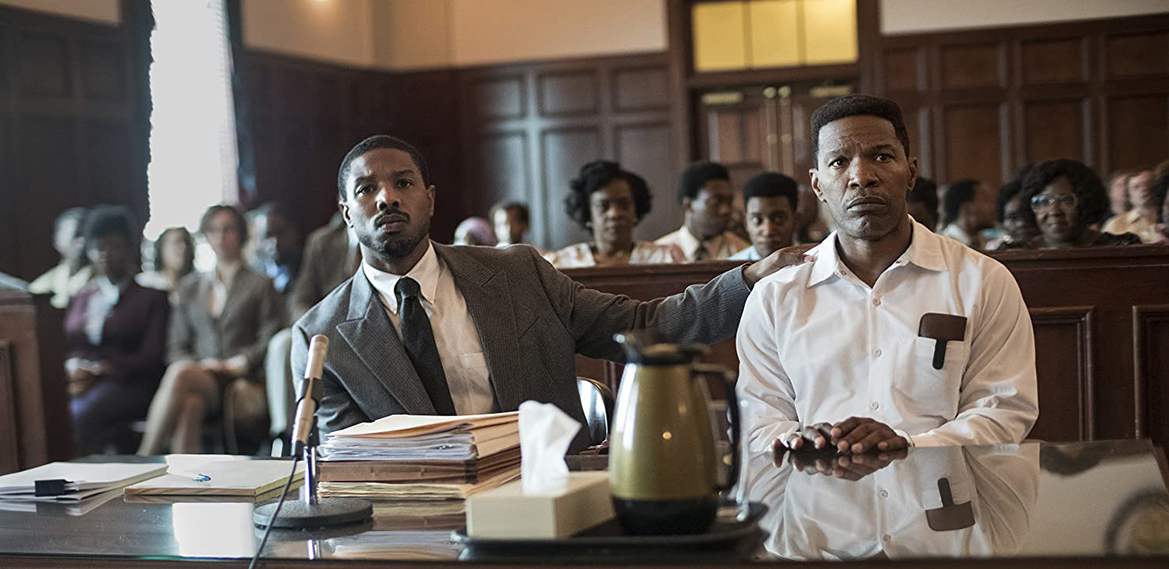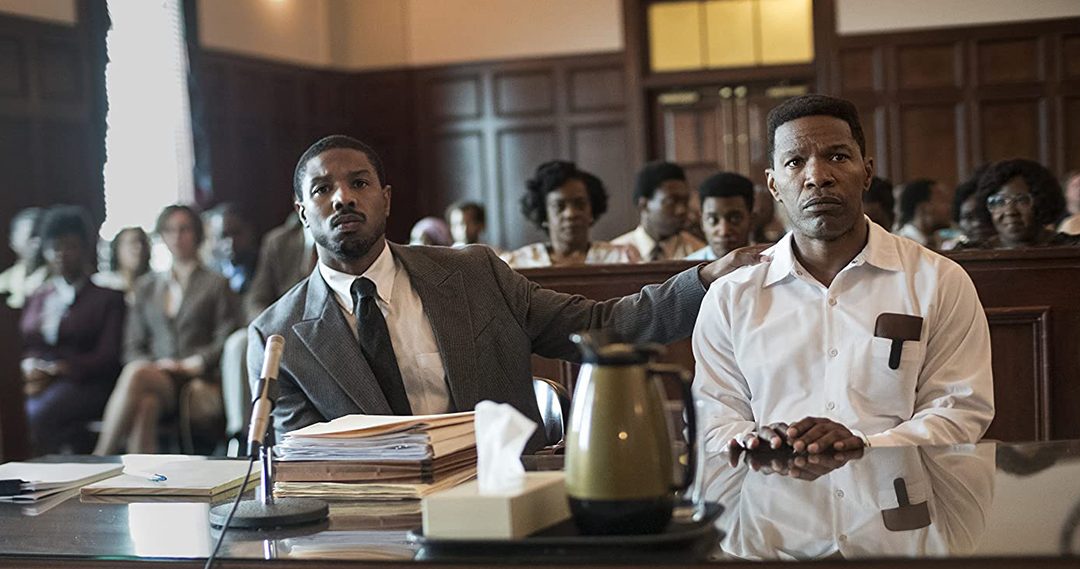“Underwater” is also new to Blu-Ray this week.

I sometimes think if modern society had a polytheistic religious structure like those of our ancient ancestors, there would be a god of movies. This god would, for the most part, be a lazy, unimaginative lout who cared more about appealing to the basest nature of the movie-going masses than providing them with nourishment for the soul. Occasionally, however, he would get off his cloud and listen to the prayers of me, Dan, and scores of other movie critics by giving us one movie every once in a while—it’s all we ask—that cares about its characters and about telling their story.
“Just Mercy” is the answer to those prayers. There are novels that don’t give their characters this much back story. If back story is given, it’s usually of just the protagonist. In this movie’s case that is Bryan Stevenson (Michael B. Jordan), an ambitious and idealistic young lawyer fresh out of Harvard who moves to Alabama with a federal grant. His mandate is to open a pro bono law firm that gives the under-represented peoples of the community adequate representation for appeals, re-trials, and overturns. This is the type of man John Grisham would have created in a work of fiction if Bryan Stevenson wasn’t an actual person and “Just Mercy” wasn’t based on a true story.
He’s not the only one to get back story though. We also hear the trials and tribulations of his assistant Eva Ansley (Brie Larson), death row inmates Herbert Richardson (Rob Morgan) and Walter McMillan (Jamie Foxx), and convict Ralph Myers (Tim Blake Nelson). All of them have an important role in acclimating Stevenson to the way of life in the community as well as shaping who he becomes as a champion of just causes in Alabama in the late ‘80s and early ‘90s.
Not that these good folks are the only ones who have a hand in shaping Stevenson. The yin must have a yang, and Stevenson’s opposition is in the form of a local sheriff (Michael Harding) and prosecutor (Rafe Spall) who do all in their power to not allow Stevenson to get another trial for McMillan. This is in spite of new revelations and exculpatory evidence that should allow McMillan to go free. The prosecutor says it is his duty to protect the safety of the community by upholding the conviction. Stevenson makes the wise counter-argument that his duty is to see that justice is served and ignoring new evidence means that a killer is still at large.
The Alabama community that serves as the setting for “Just Mercy” prides itself on its Harper Lee museum. This is the town where she wrote he classic award-winning novel “To Kill a Mockingbird” and the town’s old courthouse where her father (the inspiration for Atticus Finch in her book) practiced law is now the museum. That is all superficial, however. If folks like the sheriff and prosecutor actually read the book (or saw the movie with Gregory Peck’s excellent performance as Atticus), then they missed its meaning entirely.
The sheriff at one point calls Stevenson out for who he is and what he is doing. He reads Stevenson as a well-educated northerner who is coming to the south to teach the corrupt racists cops and lawyers down there a lesson. He’s wrong in this assessment. Stevenson is more pro-justice than anything and is not looking to teach any lessons. He just wants inmates who had poor representation at their initial trials to get a fair hearing. The sheriff, however, is not entirely self-delusional. As much as the race issue is present in the story of “Just Mercy,” there is a factor of class as well. The sheriff’s treatment of Tim Blake Nelson’s Ralph Myers is just as cruel and harsh as anything he would do to a black man. The sheriff does see color, no doubt, but before he sees color he sees class. That is arguably an even bigger fight.
“Just Mercy” handles these elements of race and class in a careful and measured way. The movie never turns didactic and the characters are never entirely right or wrong or good or bad. The sheriff and the prosecutor genuinely believe they are good people who are protecting the community and doing the right thing. Herbert Richardson actually did the crime he was convicted for. While William McMillan was innocent, it’s uncovered that he did cheat on his wife at one point. Not cool, but nothing a man should be on death row for doing.
This movie should be required viewing for all Hollywood executives to take note: This is how a movie with these themes should be handled. Not by jamming your agenda down the audience’s throat and calling them names after they gag on all of the preaching. But rather by taking a balanced, nuanced, intelligent, and dare I say it—humanist—approach to the material. Give us good stories about complex characters facing difficult struggles and having to make tough, sometimes life-altering decisions. Please—I hate having to wait for the god of movies to come around and give me something like this. Buy it.
Within the first 15 minutes of “Underwater,” I thought I knew what I was in for with the movie’s plot. The year is 2050. While brushing her teeth, deep sea drill team member Norah (Kristen Stewart) notices a leak coming from the ceiling. This is an inconvenience on land but potentially disastrous when seven miles under the ocean surface. The worst does happen as walls explode, water gushes down hallways like it just got off the elevator in a Stanley Kubrick movie, and Norah makes it to safety sans shoes. I thought something might be made of this fact, “Die Hard” style, but no. Though I will give Stewart points for a lack of vanity, as the escape to safety leaves her with some cuts and scrapes on her face that she carries through the rest of the movie.
From here, she teams up with fellow crew members Captain (Vincent Cassel), Paul (T.J. Miller), Emily (Jessica Henwick), Smith (John Gallagher Jr.), and Rodrigo (Mamoudou Athie) to traverse the ocean floor and make their way to another part of the station where they can take escape pods to safety. At this point I was delighted, thinking this movie was a throwback to the classic Irwin Allen disaster movies of the 1970s, most notably “The Poseidon Adventure”—though “The Towering Inferno” is still my favorite.
The movie plays like this for a beat and a half, before it introduces a new sea creature that is of course hostile to the humans who are meddling where they don’t belong and hunts them down one by one along their journey. Why did the movie have to go there? Did the movie makers think they were fooling anyone by essentially giving us a space story/”Alien” rip-off and setting it in the deep ocean instead of deep space? There was already enough danger with the collapsing drilling station and perilous journey from one area to the other. This movie could have worked so well as a straight survival story in a situation where one wrong move could be a character’s last. Instead they have to fill it out with alie—I mean, sea creature—attacks with PG-13 blood and horror. This essentially means that when the creatures attack it’s hard to tell what is happening because it’s so chaotically filmed. The fact that the deep sea diving suits make all the characters look the same from the outside doesn’t help either.
The sea creatures themselves aren’t that special or interesting until we get to the end. Without revealing too much, the third act does give us a good look at a giant sea monster that appears very much like illustrations of H.P. Lovecraft’s cosmic monster Cthulhu. Though given the deep sea setting of “Underwater,” the creature would be a closer relation to Lovecraft’s “Dagon.” While they may be Lovecraftian, I would not consider this to be a Lovecraft-inspired work. It pulls too many punches and is not as macabre as something from Lovecraft. “Underwater” is more standard escapist entertainment with a little suspense, a lot of clichés and tropes, and a cool monster at the end. Stream it.



